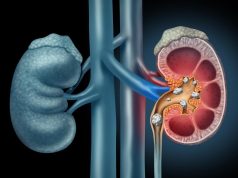Access to urologic care, processes of care cut risk of repeat emergency encounters
TUESDAY, March 23, 2015 (HealthDay News) — The need for repeat high-acuity care affects one in nine patients discharged from initial emergency department visits for kidney stones, according to a study published online March 16 in Academic Emergency Medicine.
Charles D. Scales Jr., M.D., from the Duke University School of Medicine in Durham, N.C., and colleagues analyzed data from all patients in California initially treated and released from emergency departments for kidney stones from February 2008 through November 2009. The authors sought to identify associations between patient-level characteristics, area health care resources, processes of care, and the risk of repeat emergency department visits.
The researchers found that among 128,564 patients discharged from emergency care, 11 percent had at least one additional emergency visit for treatment of their kidney stone, with nearly one in three of these patients requiring hospitalization or an urgent temporizing procedure at the second visit. On multivariable analysis, the risk of an emergency revisit was associated with insurance status (e.g., Medicaid versus private insurance; odds ratio [OR], 1.52). Greater access to urologic care was associated with lower odds of an emergency revisit (highest versus lowest quartile OR, 0.88). Performance of a complete blood count was also associated with decreased odds of revisit (OR, 0.86).
“Efforts are indicated to identify preventable causes of emergency department revisits for kidney stone patients and design interventions to reduce the risk of high-cost, high-acuity, repeat care,” the authors write.
Copyright © 2015 HealthDay. All rights reserved.








